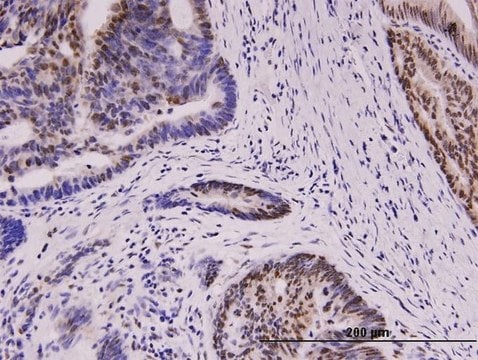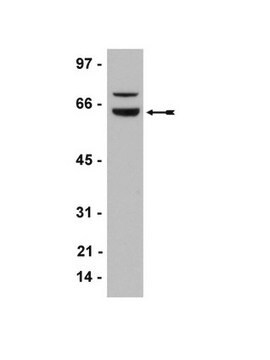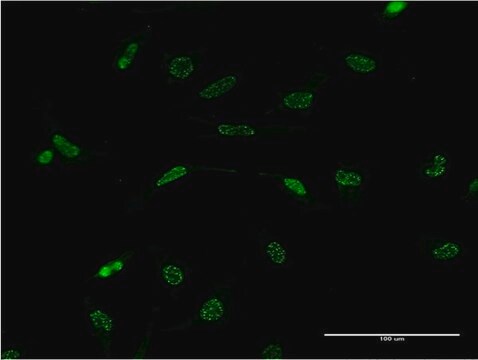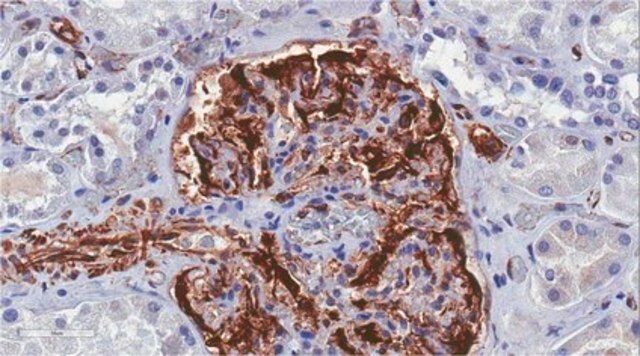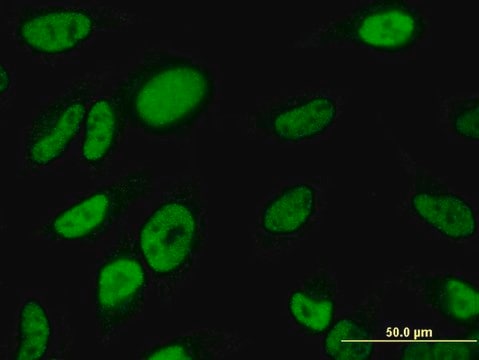ZRB1677
Anti-Wilms Tumor Protein Antibody, clone 2O18 ZooMAb® Rabbit Monoclonal

recombinant, expressed in HEK 293 cells
Szinonimák:
WT33
About This Item
IHC (p)
WB
immunohistochemistry (formalin-fixed, paraffin-embedded sections): suitable
western blot: suitable
Javasolt termékek
biológiai forrás
rabbit
Minőségi szint
rekombináns
expressed in HEK 293 cells
konjugátum
unconjugated
antitest forma
purified antibody
antitest terméktípus
primary antibodies
klón
2O18, recombinant monoclonal
leírás
recombinant, expressed in HEK 293 cells
termékcsalád
ZooMAb® learn more
Forma
lyophilized
molekulatömeg
calculated mol wt 49.19 kDa
observed mol wt ~54 kDa
tisztítva
using Protein A
faj reaktivitás
human
faj reaktivitás (homológia által előrejelzett)
monkey, mouse, rat
kiszerelés
antibody small pack of 25 μL
környezetbarátabb alternatív termék tulajdonságai
Waste Prevention
Designing Safer Chemicals
Design for Energy Efficiency
Learn more about the Principles of Green Chemistry.
fejlettebb validálás
recombinant expression
Learn more about Antibody Enhanced Validation
sustainability
Greener Alternative Product
technika/technikák
immunocytochemistry: suitable
immunohistochemistry (formalin-fixed, paraffin-embedded sections): suitable
western blot: suitable
izotípus
IgG
epitóp szekvencia
N-terminal half
Protein ID elérési szám
UniProt elérési szám
környezetbarátabb alternatív kategória
, Aligned
kiszállítva
ambient
tárolási hőmérséklet
2-8°C
célzott transzláció utáni módosítás
unmodified
Géninformáció
human ... WT1(7490)
Általános leírás
Each ZooMAb® antibody is manufactured using our proprietary recombinant expression system, purified to homogeneity, and precisely dispensed to produce robust and highly reproducible lot-to-lot consistency. Only top-performing clones are released for use by researchers. Each antibody is validated for high specificity and affinity across multiple applications, including its most commonly used application. ZooMAb® antibodies are reliably available and ready to ship when you need them.
Egyediség
Immunogén
Alkalmazás
Evaluated by Western Blotting in HEK293 cell lysate.
Western Blotting Analysis: A 1:10,000 dilution of this antibody detected Wilms Tumor Protein in HEK293 cell lysate.
Tested applications
Western Blotting Analysis: A 1:10,000 dilution from a representative lot detected Wilms Tumor Protein in OVCAR-3 cell lysate.
Immunocytochemistry Analysis: A 1:100 dilution from a representative lot detected Wilms Tumor Protein (WT33) in OVCAR-3 cells.
Immunohistochemistry (Paraffin) Analysis: A 1:100 dilution from a representative lot detected Wilms Tumor Protein (WT33) in human kidney tissue sections.
Note: Actual optimal working dilutions must be determined by end user as specimens, and experimental conditions may vary with the end user
Cél megnevezése
Fizikai forma
Feloldás
Tárolás és stabilitás
Jogi információk
Jogi nyilatkozat
Nem találja a megfelelő terméket?
Próbálja ki a Termékválasztó eszköz. eszközt
Tárolási osztály kódja
11 - Combustible Solids
WGK
WGK 1
Lobbanási pont (F)
Not applicable
Lobbanási pont (C)
Not applicable
Válasszon a legfrissebb verziók közül:
Analitikai tanúsítványok (COA)
Nem találja a megfelelő verziót?
Ha egy adott verzióra van szüksége, a tétel- vagy cikkszám alapján rákereshet egy adott tanúsítványra.
Már rendelkezik ezzel a termékkel?
Az Ön által nemrégiben megvásárolt termékekre vonatkozó dokumentumokat a Dokumentumtárban találja.
Tudóscsoportunk valamennyi kutatási területen rendelkezik tapasztalattal, beleértve az élettudományt, az anyagtudományt, a kémiai szintézist, a kromatográfiát, az analitikát és még sok más területet.
Lépjen kapcsolatba a szaktanácsadással
